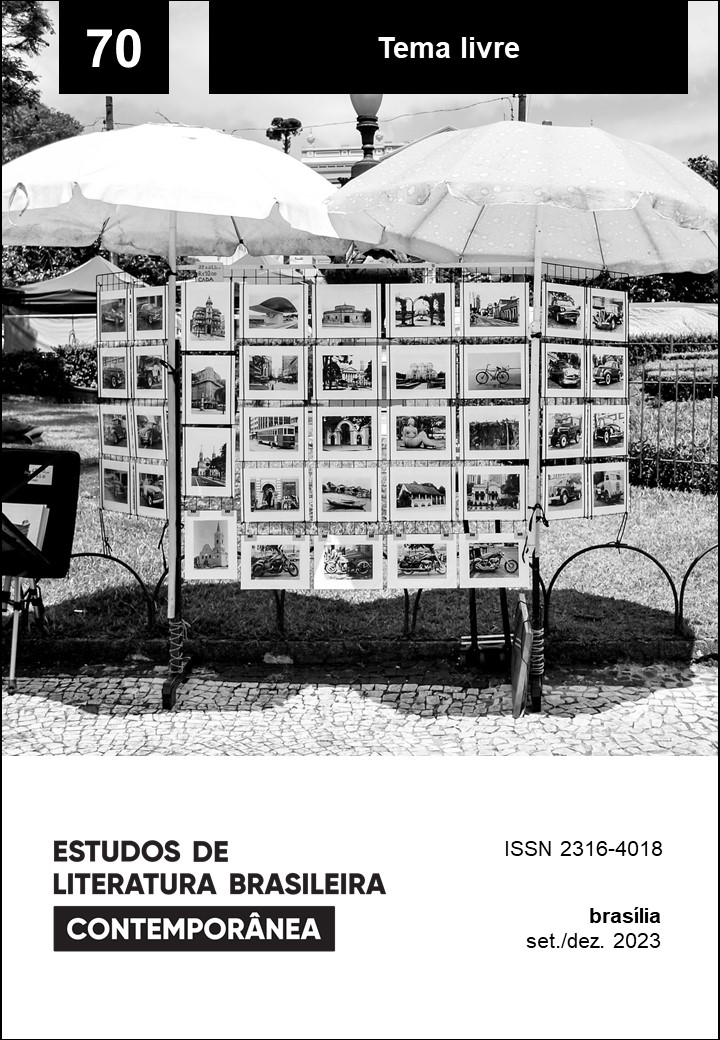Becoming-ground in Jota Mombaça’s visionary fiction literature
DOI:
https://doi.org/10.1590/2316-40187009Keywords:
visionary fiction; Brazilian literature; minority; becomingAbstract
We start from the contested territory of contemporary Brazilian literature (Dalcastagnè, 2012), characterized by a historical erasure of women writers, mainly black women, to address an aggravating factor in these discussions: the invisibility of trans, travestis and non-binary writers in contemporary Brazilian literature. Faced with this problem, our objective is to map the becoming-earth in the visionary fiction literature of Jota Mombaça (2021). And, to this end, we have divided this article into three moments. In the first, we present the concept “visionary fiction”, by writer Walidah Imarisha (2016). In the second, we present the concept “ordered world”, by writer Denise Ferreira da Silva (2019). And in the third moment, we analyze the movement of transition to the ground, by the writer Jota Mombaça, based on two chapters of the book They won’t kill us now (Mombaça, 2021). This analysis is intertwined with the concept of “becoming”, in the text Literature and Life (Deleuze, 1997). Based on these discussions, our hypothesis is that Jota Mombaça’s visionary fiction literature announces to minorities that a molecular revolution will come, with a view to the decolonization of the colonial, capitalist and neoliberal world, the end of the world as we know it.
Downloads
References
AZEVEDO, Celina Dias (2021). Duas mulheres velhas e a Academia Brasileira de Letras! Geledés Disponível em: https://www.geledes.org.br/duas-mulheres-velhas-e-a-academia-brasileira-de-letras Acesso em: 20 set. 2023.
» https://www.geledes.org.br/duas-mulheres-velhas-e-a-academia-brasileira-de-letras
BENEVIDES, Bruna G. (2023). Dossiê: assassinatos e violências contra travestis e transexuais brasileiras em 2022. Brasília: Distrito Drag; Antra. Disponível em: https://antrabrasil.files.wordpress.com/2023/01/dossieantra2023.pdf Acesso em: 12 set. 2023.
» https://antrabrasil.files.wordpress.com/2023/01/dossieantra2023.pdf
BRASIL (2020). Crescem denúncias de violência doméstica durante pandemia. Câmara dos Deputados Disponível em: https://www.camara.leg.br/noticias/661087-crescemdenuncias-de-violencia-domestica-durante-pandemia Acesso em: 3 abr. 2021.
» https://www.camara.leg.br/noticias/661087-crescemdenuncias-de-violencia-domestica-durante-pandemia
BUTLER, Octavia Estelle (2018). A parábola do semeador São Paulo: Morro Branco.
BUTLER, Octavia Estelle (2019). Kindred: laços de sangue. São Paulo: Morro Branco.
BUTLER, Octavia Estelle (2021). Semente originária São Paulo: Morro Branco.
COSTA, Pablo Assumpção Barros; GREINER, Christine (2020). Dobrar a morte, despossuir a violência: corpo, performance, necropolítica. Conceição/Conception, Campinas, v. 9, p. 1-19. https://doi.org/10.20396/conce.v9i00.8661341
» https://doi.org/10.20396/conce.v9i00.8661341
DALCASTAGNÈ, Regina (2012). Um território contestado: literatura brasileira contemporânea e as novas vozes sociais. Iberic@l, Paris, n. 2, p. 13-18. Disponível em: https://iberical.sorbonne-universite.fr/wp-content/uploads/2012/03/002-02.pdf Acesso em: 2 nov. 2021.
» https://iberical.sorbonne-universite.fr/wp-content/uploads/2012/03/002-02.pdf
DELEUZE, Gilles (1997). Crítica e clínica São Paulo: Editora 34.
DELEUZE, Gilles (2010). Sobre o teatro: Um manifesto de menos; O esgotado. Tradução de Fátima Saadi, Ovídio de Abreu e Roberto Machado. Rio de Janeiro: Jorge Zahar.
DELEUZE, Gilles; GUATTARI, Félix (2011). Mil platôs: capitalismo e esquizofrenia 2. São Paulo: Editora 34. v. 1.
DELEUZE, Gilles; GUATTARI, Félix (2012). Mil platôs: capitalismo e esquizofrenia 2. São Paulo: Editora 34. v. 4.
FERREIRA DA SILVA, Denise (2019). A Dívida Impagável São Paulo: Oficina de Imaginação Política; Living Commons; A Casa do Povo.
GEREMIAS, Priscilla (2021). Amara Moira fala da literatura trans como ferramenta de combate à transfobia. Marie Claire, Porto Alegre. Disponível em: https://revistamarieclaire.globo.com/Cultura/noticia/2021/01/amara-moira-fala-da-literatura-trans-como-ferramenta-de-combate-transobia.html Acesso em: 3 abr. 2022.
IMARISHA, Walidah (2016). Reescrevendo o futuro: usando ficção científica para rever a justiça. In: 32ª Bienal de São Paulo. Disponível em: https://issuu.com/amilcarpacker/docs/walidah_imarisha_reescrevendo_o_fut Acesso em: 18 ago. 2022.
» https://issuu.com/amilcarpacker/docs/walidah_imarisha_reescrevendo_o_fut
MOMBAÇA, Jota (2021). Não vão nos matar agora Rio de Janeiro: Cobogó.
NIETZSCHE, Friedrich (2008). Sobre Verdade e Mentira no sentido extramoral. In: NIETZSCHE, Friedrich. Sobre Verdade e Mentira São Paulo: Hedra. p. 25-50.
OLIVEIRA, Ítalo (2022). Djamila Ribeiro é a 1ª negra na Academia Paulista de Letras. Notícia Preta Disponível em: https://noticiapreta.com.br/djamila-ribeiro-e-a-1a-negra-na-academia-paulista-de-letras Acesso em: 20 set. 2023.
» https://noticiapreta.com.br/djamila-ribeiro-e-a-1a-negra-na-academia-paulista-de-letras
Downloads
Published
How to Cite
Issue
Section
License

This work is licensed under a Creative Commons Attribution-NoDerivatives 4.0 International License.
Authors who publish in this journal agree to the following terms:
a) The authors maintain the copyright and grant the journal the right of first publication, the work being simultaneously licensed under the Creative Commons Attribution License-Non Commercial 4.0 which allows the sharing of the work with acknowledgment of the authorship of the work and publication this journal.
b) Authors are authorized to enter into additional contracts separately, for non-exclusive distribution of the version of the work published in this journal (eg publish in institutional repository or as a book chapter), with authorship recognition and publication in this journal.
c) Authors are allowed and encouraged to publish and distribute their work online (eg in institutional repositories or on their personal page) after the editorial process, as this can generate productive changes, as well as increase the impact and citation of published work (See The Effect of Free Access).
d) The authors of the approved works authorize the magazine to, after publication, transfer its content for reproduction in content crawlers, virtual libraries and the like.
e) The authors assume that the texts submitted to the publication are of their original creation, being fully responsible for their content in the event of possible opposition by third parties.


